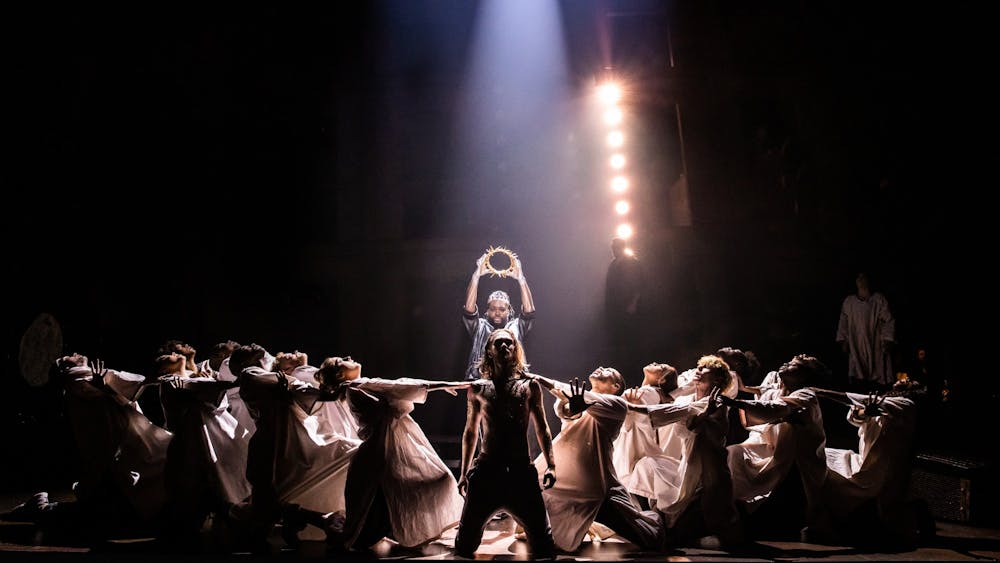At the top of "Jesus Christ Superstar," the apostles ask their proclaimed 'superstar' messiah Jesus Christ: "What's the buzz / tell me what's-a-happening?"
The answer in this production is not much. The 50th Anniversary touring production of the 1971 rock opera that opened at ASU Gammage as part of its 2022-2023 season is a revival that makes up for a lack of depth with glittery, feverish energy.
Premiering in 1970 as a concept album by Andrew Lloyd Webber with Tim Rice's lyrics, "Jesus Christ Superstar" had interesting potential for theater. The story is a straightforward retelling of The Passion of Jesus Christ as well as the trials and insurrection that led to his crucifixion. But the score was inventive, challengingly novel against other musicals of that time with its sung-through rock opera structure.
Now, amidst many popular rock musicals like "Spring Awakening" and "American Idiot," this production straddles the line between being faithful to the original material and finding timely relevance.
This precisely choreographed revival has a first-rate physical production. The two-storied unit set featuring a dilapidated church wall with a large crucifix in the middle (and many other crucifixes elsewhere) functions as a temple, a court and a castle among other things.
The five-piece band confidently delivers the electrically-charged rock score. The overture is exhilarating: Andrew Lloyd Webber's compositions are memorable, at least tonally, if not for their emotional complexity.
The ensemble, gifted and diverse, double as apostles, lepers, soldiers and a mob. They circle Jesus, played by Jack Hopewell, who sings the role very well with distinctly modern vocals and a minuscule frame accurate to King Herod’s description. Clad in sneakers and a jacket with a man-bun, this Jesus feels connected to our time: eerily similar to male influencers on social media who push strong opinions to their devoted followers.
But other places lack that modern connection. Mary Magdalene, played by Faith Jones who injects complex, mature feeling into the not-so-complex-and-mature lyrics of her ballads, is the one female principle in the show. The role is underwritten and fails the talents of the performer. Her love for Jesus is never explored beyond consolation and hostility, leaving her sidelined even in a modern revival.
"King Herod’s Song" has always been a comedic point of the show at the expense of anointing queer subtext to a tyrannical figure. Flamboyance is a staple piece of comedy in older Broadway shows, usually showing a man flouncing around stage can get an older audience to laugh a lot which is pretty inappropriate now. Doubling down on such discomforting subtext to elicit humor feels cruel and outdated.
The use of onstage microphones and excessive glitter play to mostly good effect: mics inventively double as priest staffs in "This Jesus Must Die." The number is a highlight of the show with costume-incorporating choreography and lighting cues.
Elvie Ellis’s Judas, whose powerful yet fragile tenor morphs into desperation, soaks his hand in a casket of glitter after the priests convince him to accept a sum of their money as a fee to betray Jesus. His hands, covered in blood, shimmer under the lighting. Sure, lustrous things are implied to be rare and valuable, but Jesus’s blood is red. The staging places them as equals, but the props suggest the opposite.
Sung-through musicals have two intrinsic challenges: they must propel the plot entirely through song while simultaneously making its characters compelling enough. It helps that "Jesus Christ Superstar" has a pre-existing story for a plot, but Timothy Sheader's direction, while effective in mounting the ensemble around the stage and punctuating crucial moments, does not reveal much about its characters.
The song "Gethsemane" is a burden, both in having to reveal Jesus’s complicated epiphany in one song and demanding the performer to hit the highest notes of the show. Hopewell's interpretation is compelling, but the moment's heft falls short due to the microphone-in-hand and concert-like staging.
In a talk at the University of Pennsylvania, "Jesus Christ Superstar" composer Webber's long-time collaborator and late theater director Hal Prince discussed his work with Webber and some of their greatest successes, among them "Phantom of the Opera," "Evita" and "Cats."
Prince mentioned asking the composer what his intention was beneath the commercial and popular success that featured anthropomorphic cats, Webber famously replied: "Hal, it's just about cats."
Perhaps "Jesus Christ Superstar" is exactly that. Staged in the 1970s or now, it is simply a rock musical about the Passion of Jesus Christ. And that alone makes for a well-performed and entertaining evening at the theater.
Edited by Claire van Doren, Jasmine Kabiri, Sophia Balasubramanian and Caera Learmonth.
Reach the reporter at ssswamin@asu.edu and follow @shriiiitt on Twitter.
Like The State Press on Facebook and follow @statepress on Twitter.




